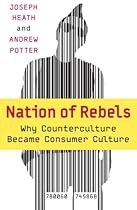Nation of Rebels: Why Counterculture Became Consumer Culture

| Author | : | |
| Rating | : | 4.21 (601 Votes) |
| Asin | : | 006074586X |
| Format Type | : | paperback |
| Number of Pages | : | 368 Pages |
| Publish Date | : | 2015-09-26 |
| Language | : | English |
DESCRIPTION:
The authors tear into veterans of the '60s counterculture repeatedly, and blaming the "all or nothing" approach of would-be radicals who drop out for holding back progress. Their theoretical underpinnings range from critiques of Freud to French postmodernism, and they layer their philosophical arguments with personal experience (though the use of "I" without identifying the writer as either Heath or Potter becomes irritating). From Publishers Weekly So-called rebellion not only perpetuates the market economy, it's the economy's biggest driving factor. All rights reserved. Copyright © Reed Business Information, a division of Reed Elsevier Inc. The arguments are familiar, but Heath and Potter's sustained scrutiny of the premises from a market perspective freshens them. So argue Canadian philosophy prof
Caraculiambro said when everybody's a rebel, nobody's a rebel. This is a book about the counterculture movement by two Canadian culture critics. It actually helped me do a lot of growing up.That's a bit embarrassing for me to admit, since I'm writing this in middle age, by which time life is supposed to have smacked one's various immaturities and ideological obtusenesses out of you one way or another.But no. We all have various idiocies lingering under the surface, left over from our younger years, many times having gotten lodged deep inside our craniums during our college years, or as a result of having spent our lives immersed in pop culture.I have a lot fewer illusions after reading th. brilliant book, but within limits A good book to consider in tandem with this one is James Masterson's "The Search for the Real Self." Masterson's thesis is that those with borderline and narcissistic personality disorders have never really had support for the development of real, authentic, core selves. It's but a small leap from there to Christopher Lasch's "The Culture of Narcissism." The idea is that many, and perhaps most, Americans today have that pervasive sense of emptiness, a lack of self.One of the authors of "Nation of Rebels" admits to having been a punk rocker rebel in a prior phase of life. He then goes on to say that that phase was, he realized . Justin Bean said Mandatory reading for all considering themselves part of the counterculture. Nation of Rebels is one of those books that left me thinking 'wow, everything I know is wrong'. If you can excuse the hyperbole, what I mean is that this book, which is clearly written and pleasurable to read despite tackling complex economic and philosophical issues (from Marx and Bourdieu to Freud and Hobbes), severely challlenged the foundation upon which I had built my understanding of the intersection of politics, culture, globalization, and capitalism. One must have an open mind coming into this book, and it helps to know the arguments made by the present countercultural elite (such as Naomi Klein in No Logo), although t
And the idea that mocking or simply hoping the "system" will collapse, the authors argue, is not only counterproductive but has helped to create the very consumer society radicals oppose.In a lively blend of pop culture, history, and philosophical analysis, Heath and Potter offer a startlingly clear picture of what a concern for social justice might look like without the confusion of the counterculture obsession with being different.. The idea of a counterculture -- a world outside of the consumer-dominated world that encompasses us -- pervades everything from the antiglobalization movement to feminism and environmentalism. In this wide-ranging and perceptive work of cultural criticism, Joseph Heath and Andrew Potter shatter the most important myth that dominates much of radical political, economic, and cultura
